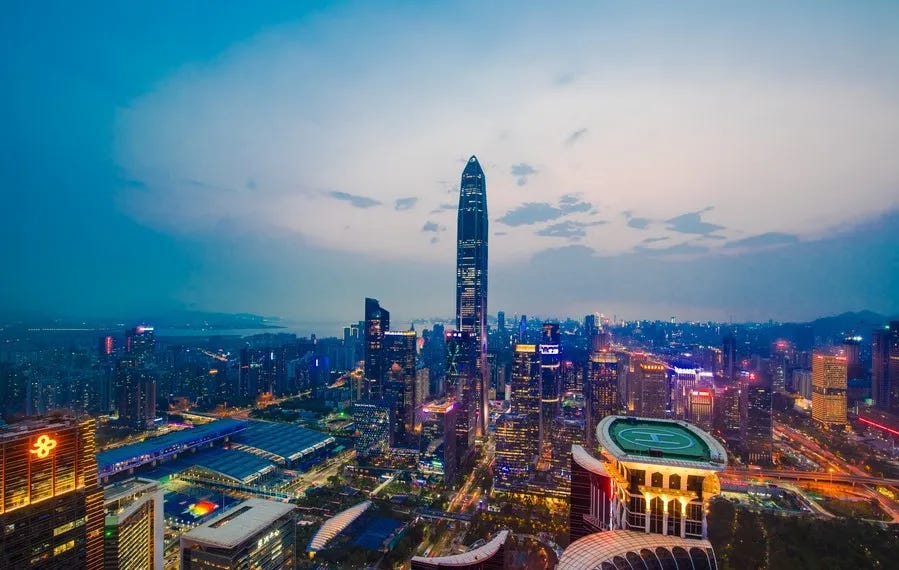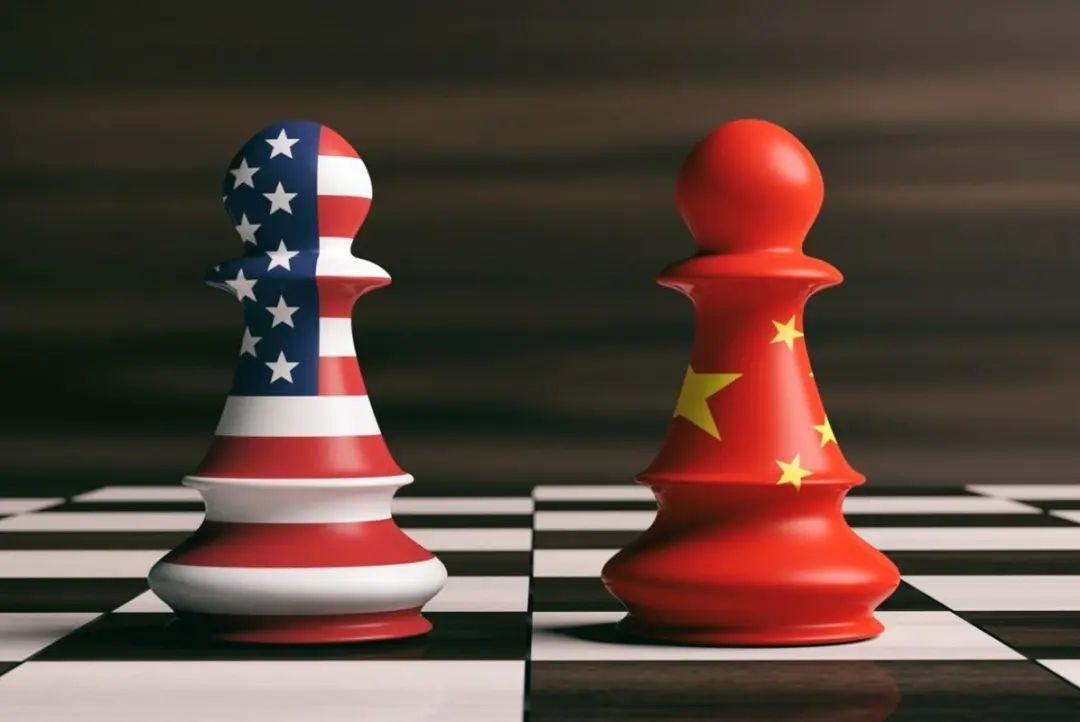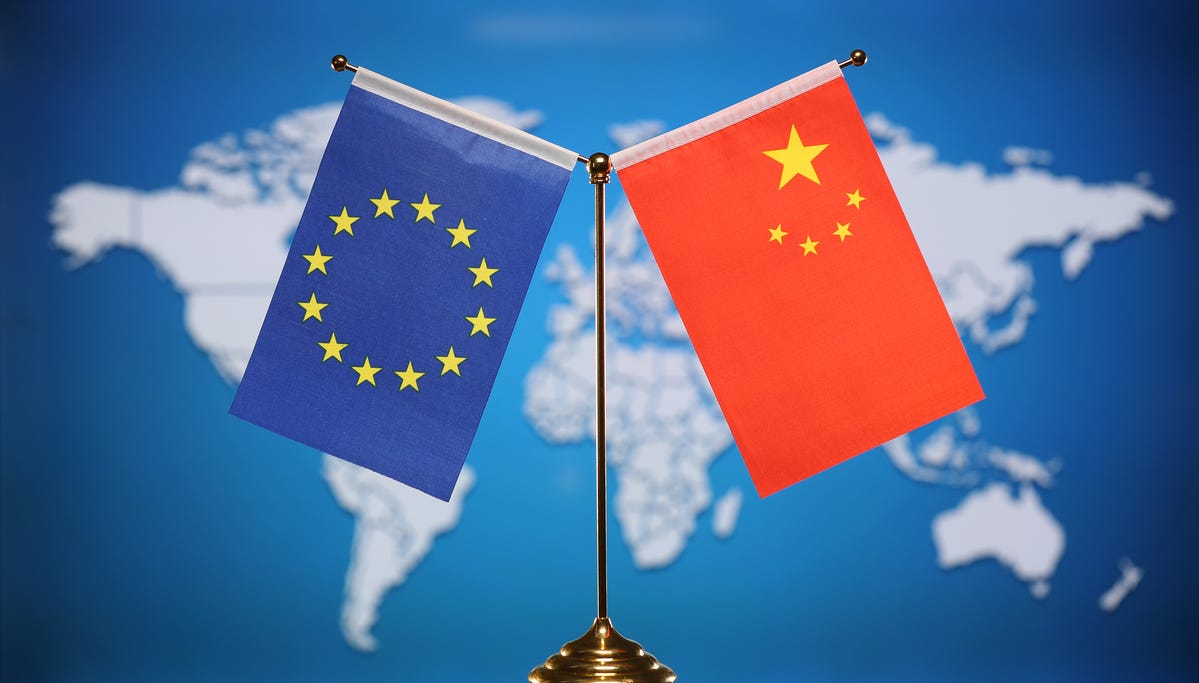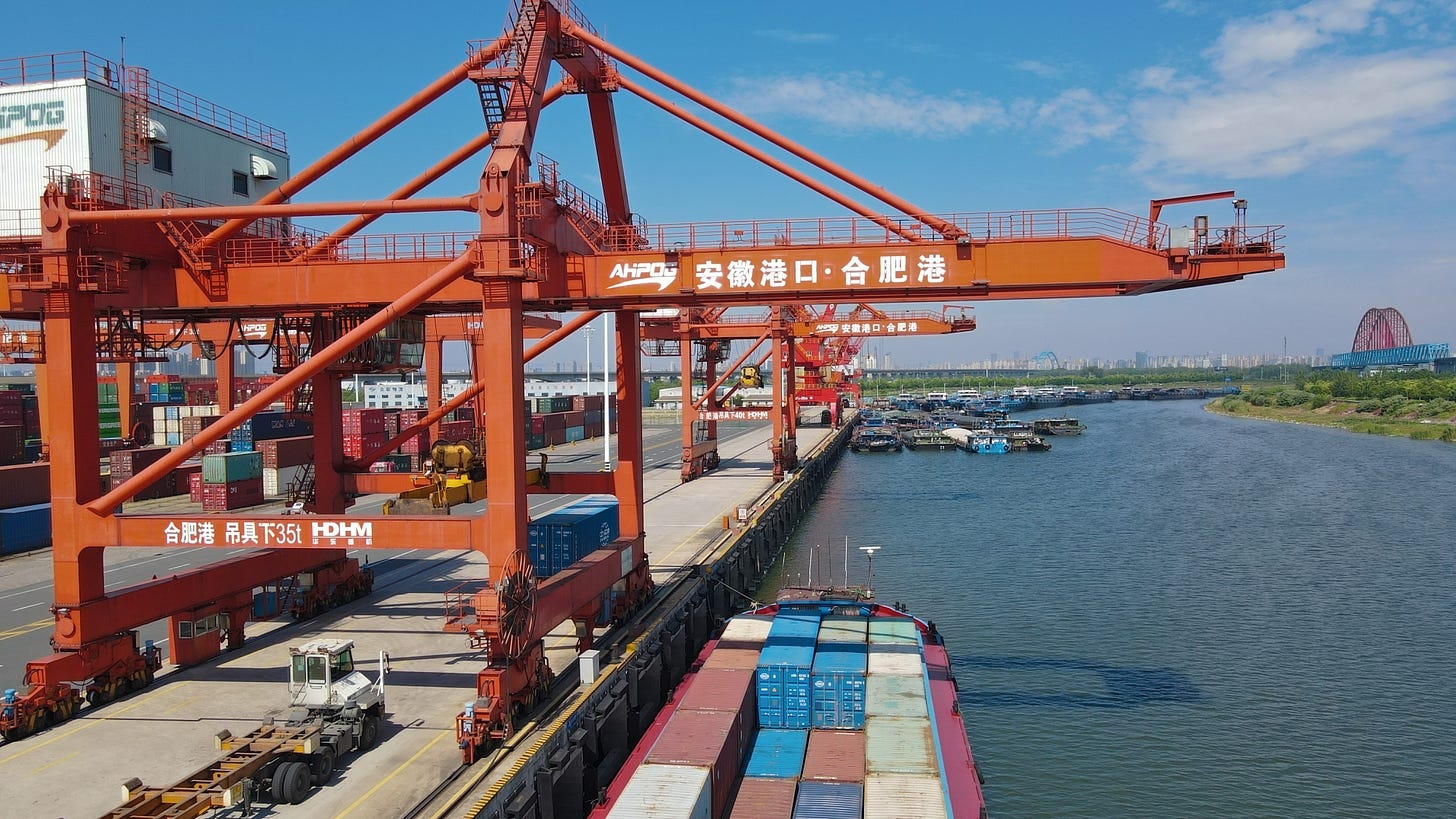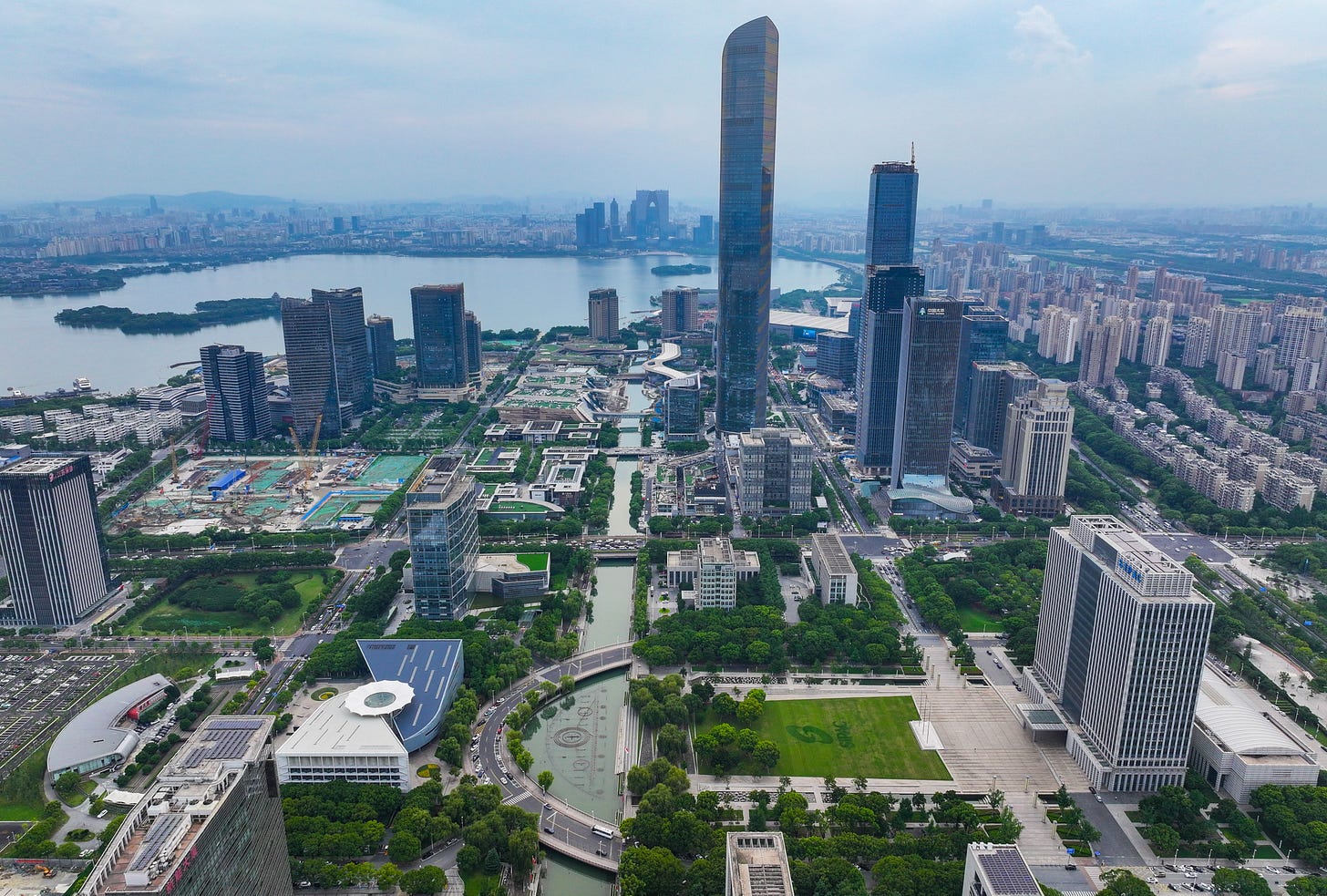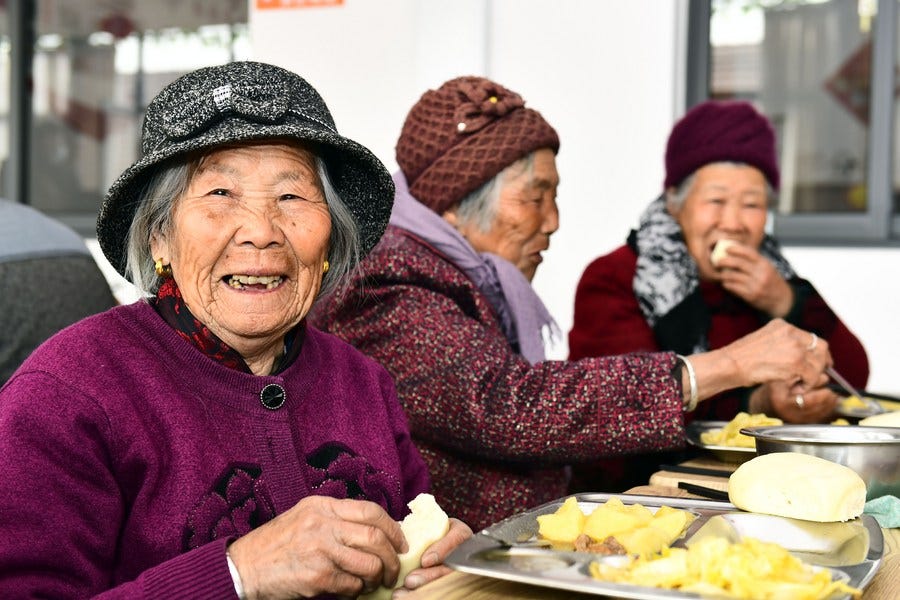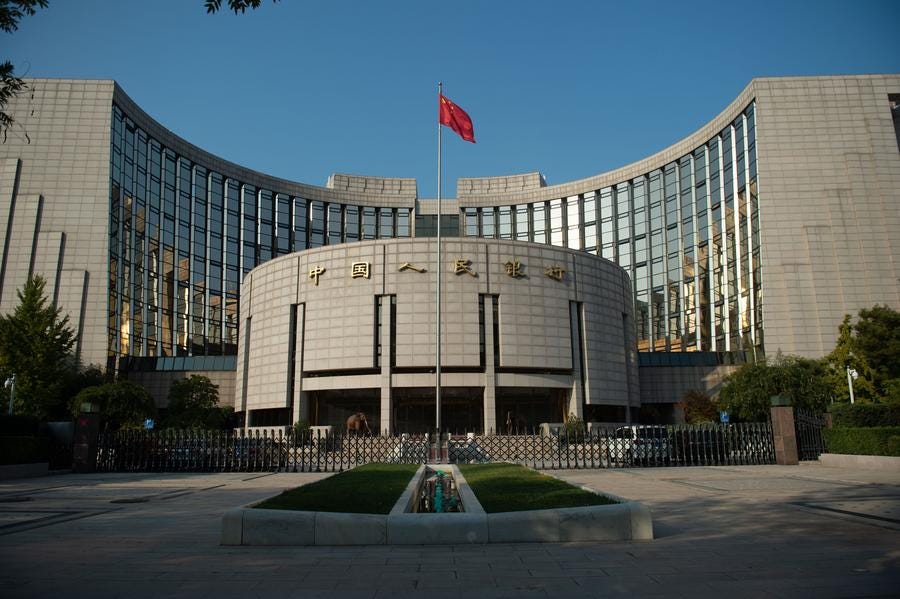Must-Read China Economic News (Dec. 6-Dec. 23)
China's Central Economic Work Conference, China-U.S. financial working group meeting, China's foreign trade...
Greetings and welcome to the latest edition of Peking Ensight! We're thrilled to have you join us once again as we navigate the ever-evolving landscape of the Chinese economy.
⭐Under the Spotlight
China holds Central Economic Work Conference to make plans for 2025
The annual Central Economic Work Conference was held in Beijing from Dec. 11 to 12 as Chinese leaders decided priorities for the economic work in 2025.
While acknowledging the deepened adverse impact brought about by changes in the external environment and many difficulties and challenges still facing the domestic economic operation at present, the meeting pointed out that the supporting conditions and fundamental trend for the Chinese economy's long-term sound development remain unchanged.
More proactive and impactful macro policies should be implemented to sustain the upward trend of the economy, so as to fulfill the goals and tasks in the 14th Five-Year Plan (2021-2025) with high quality and lay a solid foundation for a good start to the 15th Five-Year Plan (2026-2030), the meeting said.
For next year, the meeting emphasized the need to maintain steady economic growth, keep employment and prices generally stable, ensure a basic equilibrium in the balance of payments, and increase residents' income in step with economic growth.
The country should adopt a more proactive fiscal policy and set a higher deficit-to-GDP ratio, and it should ensure that its fiscal policy is continuously forceful and more impactful, according to the meeting.
It pledged to increase the issuance of ultra-long special treasury bonds and local government special-purpose bonds, and optimize the structure of fiscal expenditure.
A moderately loose monetary policy should be implemented, with reductions in the reserve requirement ratio and interest rates at an appropriate timing to ensure ample liquidity, according to the meeting.
Outlining a number of key tasks for 2025, the meeting urged efforts to vigorously boost consumption, improve investment efficiency, and expand domestic demand on all fronts.
A special campaign dedicated to stimulating consumption should be implemented, and efforts should be made to increase the incomes and alleviate the burdens of low- and middle-income groups, the meeting noted.
The large-scale equipment upgrades and consumer goods trade-in programs should be promoted with greater intensity and scope, and active efforts should be made to develop debut economy, ice and snow economy and silver economy, according to the meeting.
It called for stronger support for implementing major national strategies and building security capacity in key areas, and appropriately increased investment from the central government budget.
China should take steps to make scientific and technological innovation drive the development of new quality productive forces and build a modernized industrial system, the meeting said.
Xi urges deepening rural reform, building up strength in agriculture
Chinese President Xi Jinping has urged further deepening rural reform and making solid advances toward the goal of building up China's strength in agriculture.
Xi made the remarks in his instructions on work related to agriculture, rural areas and farmers, which was learned at the annual central rural work conference held in Beijing from Dec. 17 to 18.
It is imperative to improve supporting systems to strengthen agriculture, benefit farmers, and enrich rural areas, and to advance rural revitalization across the board, Xi said.
Efforts should be made to ensure stable production and supply of grain and other major agricultural products, create more channels for farmers to increase incomes, continuously consolidate and expand the achievements of poverty alleviation, and ensure that no large-scale lapsing or relapsing into poverty occurs, Xi said.
He also called for solid efforts to promote rural development initiatives and turn the countryside into a beautiful and harmonious place for people to live and work in.
He stressed that Party committees and governments at all levels must prioritize the development of agriculture and rural areas, accelerate the modernization of agriculture and rural areas, further consolidate the country's agricultural foundation, bring greater prosperity to rural areas and farmers, and steadily advance toward the goal of building up China's strength in agriculture.
⭐ Bilateral Relations
China-U.S. financial working group holds seventh meeting
The China-U.S. financial working group held its seventh meeting in Nanjing, capital of east China's Jiangsu Province, on Dec. 15-16, China's central bank announced Dec. 17.
The meeting was co-chaired by Xuan Changneng, deputy governor of the People's Bank of China (PBOC), and Brent Neiman, assistant secretary for international finance at the U.S. Department of the Treasury.
Financial regulators, including the National Financial Regulatory Administration and the China Securities Regulatory Commission from the Chinese side, as well as the Federal Reserve and the Securities and Exchange Commission from the U.S. side, took part in the meeting, according to a PBOC statement.
The Chinese side provided an overview of the country's arrangements for next year's economic work, which were outlined at a meeting of the Political Bureau of the Communist Party of China Central Committee and the Central Economic Work Conference, the statement said.
The two sides had professional, pragmatic, candid and constructive discussions on topics ranging from macroeconomic and financial developments, monetary policy, financial stability, financial regulation and supervision, international financial institutions, capital market, to anti-money laundering and countering the financing of terrorism, the statement said. They also exchanged views on other financial policy topics.
The two sides were briefed on the previous technical exercises, including balance of payments compilation and climate modeling, according to the statement.
During the meeting, China's National Financial Regulatory Administration and the U.S. Federal Insurance Office updated a memorandum of understanding on facilitating communication and cooperation relating to the insurance sector.
Since its establishment, the China-U.S. financial working group has facilitated professional and pragmatic communications between the two sides, contributing to a stable China-U.S. relationship and helping preserve international financial stability, the statement said.
China firmly opposes EU adding Chinese individuals, entities on sanctions list against Russia
China deplores and firmly opposes the EU adding Chinese individuals and entities on the "fully-fledged listings" in its 15th sanctions package against Russia, a spokesperson for the Ministry of Commerce said on Dec. 19.
Noting that the EU turned a deaf ear to China's repeated representations and oppositions and acted willfully, the spokesperson said China has always opposed unilateral sanctions that have no basis in international law or authorization of the United Nations Security Council.
The spokesperson noted that the European side's actions are contrary to the consensus reached by Chinese and European leaders, negatively impacting China-EU economic and trade relations.
China urges the European side to act in line with maintaining the China-EU comprehensive strategic partnership and safeguarding the stability of the global industrial and supply chains, immediately halt its erroneous practice of blacklisting Chinese companies, and stop harming the legitimate interests of Chinese enterprises.
China will take necessary measures to resolutely protect the legitimate rights and interests of Chinese enterprises, the spokesperson said.
⭐ Key Economic Indicators
China's foreign trade shows steady growth in first 11 months
China's total goods imports and exports maintained steady growth in the first 11 months of 2024, expanding by 4.9 percent year on year in yuan terms, official data showed on Dec. 10.
Goods trade value expanded to 39.79 trillion yuan, or 5.6 trillion in U.S. dollar terms, in the January-November period, according to the General Administration of Customs (GAC).
China's exports rose 6.7 percent year on year during this period to 23.04 trillion yuan, while imports climbed 2.4 percent to 16.75 trillion yuan, the GAC data revealed.
In November alone, goods imports and exports saw a year-on-year increase of 1.2 percent to total 3.75 trillion yuan -- maintaining growth for an eighth consecutive month.
Specifically, exports of mechanical and electrical products accounted for nearly 60 percent of the total during the January-November period, with exports of containers, ships and motorcycles increasing by 108.7 percent, 65.3 percent and 24.8 percent, respectively, the data showed.
China's trade-in program boosts consumer goods sales by over 1 trillion yuan
The sales revenue of consumer goods under China's policy-backed trade-in program has surpassed 1 trillion yuan (about 139.1 billion U.S. dollars), data from China's Ministry of Commerce showed Dec. 13.
As of Dec. 13, the 2024 sales volume of passenger vehicles under the trade-in program is at 5.2 million units, according to the ministry.
Sales of home appliances had exceeded 49 million units, with sales of electric bicycles nearing 900,000 units, per the data.
In March, the State Council released an action plan to initiate large-scale equipment upgrades and consumer goods trade-ins, nearly 15 years after the last such renewal campaign.
At the end of 2023, people in China owned some 336 million civilian automobiles and over 3 billion major household appliances, including refrigerators, washing machines and air conditioners.
China's property market shows stronger signs of recovery
China on Dec. 16 released its latest home price data, indicating that the property market of the world's second-largest economy is on stronger footing for recovery, supported by a raft of policy measures.
In the country's 70 large and medium-sized cities, the decline in the prices of commercial residential homes narrowed on a year-on-year basis in November, data from the National Bureau of Statistics (NBS) showed.
The 70 cities are categorized into three tiers within the country, and each tier reported a narrowed decline last month.
In the four first-tier cities -- Beijing, Shanghai, Guangzhou and Shenzhen -- new home prices dropped 4.3 percent year on year, a decline narrowing 0.3 percentage points from October.
Notably, Shanghai, China's economic hub, saw a 5 percent increase in new home prices last month, the NBS said.
Second-hand home prices in the first-tier cities went down 8 percent last month, 1.6 percentage points narrower than the decline in October.
For the 31 second-tier and 35 third-tier cities across the country, data also showed narrower drops in both new and second-hand home prices in November, according to the NBS.
On a month-on-month basis, new home prices in the four first-tier cities remained flat in November, compared with a 0.2 percent decline in the previous month. Second-hand home prices in these cities rose by 0.4 percent.
Out of the 70 cities nationwide, 17 reported month-on-month increases in new home prices in November, up from just seven cities in October.
⭐ Policy Moves Much Talked About
China announces nationwide roll-out of private pension scheme
China on Dec. 12 announced the expansion of a private pension scheme from 36 pilot cities and regions to the entire country, effective from Dec. 15.
Serving as supplementary pension insurance, this scheme is voluntary for individuals and operated in a market-oriented manner with support from national policies, according to a notice jointly issued by five government departments including the Ministry of Human Resources and Social Security.
People who currently contribute to basic pension schemes for urban employees, non-working urban residents and rural residents can all participate in the private pension scheme, according to the notice.
The scheme allows participants to contribute up to 12,000 yuan annually to their private pension accounts, and offers them tax incentives.
The private pension mechanism will complement the country's current pension system consisting of the basic old-age pension and enterprise annuities as well as commercial insurance for the elderly, offering another layer of support for China's aging population, analysts say.
China is taking measures to address the challenges brought about by the aging population. By the end of 2023, the number of Chinese people aged 60 or above had reached 296.97 million -- accounting for 21.1 percent of the country's total population.
The private pension scheme, launched in November 2022, was piloted in 36 cities and regions including Beijing, Shanghai and Guangzhou.
China further optimizes cash-pooling service for multinational companies
A pilot cash-pooling service integrating domestic and foreign currency management for multinational companies in China will be further optimized, the country's monetary authorities said Dec. 18.
The move aims to enhance the facilitation of cross-border investment and financing for such companies, according to the People's Bank of China and the State Administration of Foreign Exchange.
The move will focus on reducing corporate financing costs, enhancing cross-border payment and receipt facilitation, streamlining cross-border fund management, and further improving capital utilization efficiency for multinational companies.
The latest move will involve 10 pilot regions including Beijing, Shanghai, Jiangsu and Zhejiang, according to the authorities.
The pilot cash-pooling service was first launched in Beijing and the southern economic powerhouse Shenzhen in 2021. It was expanded to include Shanghai, Guangdong, Shaanxi and other regions in 2022.
⭐ Read More
Why is richer-than-ever Macao still ambitious for more? (Click the title to read the full article)
Let's play a quick game. Picture Macao. What comes to mind? Neon nights pulsing with energy? Check. The grandeur of a lotus-shaped hotel piercing the skyline? Check. And, of course, the glittering casino floors -- chips clinking and fortunes made or lost in a heartbeat.
For decades, Macao has been synonymous with opulence. It is labeled the world's "gambling capital" (yes, it is not Las Vegas) and boasts one of the world's highest densities of Michelin-starred restaurants.
Since its peaceful transition from Portuguese rule to a special administrative region (SAR) of China on Dec. 20, 1999, Macao's rich blend of East-meets-West culture and heritage has remained remarkably intact. The title of a top YouTuber's travel vlog might easily read, "You won't believe this is China."
And yet, for all the glitz, wealth and acclaim, Macao is uneasy. Restless. Sure, it is Asia's richest city and a crown jewel of China's "one country, two systems" policy. But beneath the surface lies a quiet urgency. As the Macao SAR approaches its 25th anniversary, its leaders and residents are facing a fundamental question: in a city that seems to have it all, what is next?
In the 1980s, late Chinese leader Deng Xiaoping elaborated on the concept of "one country, two systems." The idea ensured that the unique characteristics of Hong Kong, which is now linked with Macao by the longest bridge-cum-tunnel sea crossing in the world, would be preserved after its 1997 transition from British colonial rule to an SAR of China. This concept was often encapsulated by the phrase: horse racing, ballroom dancing and stock trading will go on as usual. This expression illustrates the vision that Hong Kong's capitalist system, local lifestyle and legal framework would continue unchanged, maintaining Hong Kong's status as a free port and an international hub for trade and finance.
A helpful way to understand "one country, two systems" is through the concept of "live, let live and thrive being cohesive," as Hong Kong and Macao can maintain their own characteristics while contributing to and benefiting from the broader development of a unified nation. For the first time, a remarkable new chemistry between two seemingly contradictory systems has been created, possibly named "Sinergy" -- a portmanteau of "Sino" and "synergy."
This vision extended beyond rhetoric. Hong Kong's century-old horse racing culture has come to symbolize continuity, while its globally interconnected financial industry remains one of the world's best. The city's entertainment landscape continues to reflect its lifestyle traditions.
The same principle was applied to Macao, which retains its distinct social and economic systems under this shared framework. Macao's gaming industry serves as an example of this arrangement in practice, as casino gambling is banned throughout the Chinese mainland. The industry, which had previously been a monopoly, was liberalized in 2002, opening the market to more operators. By 2006, Macao's gaming revenue had surpassed that of Las Vegas, solidifying its position as the world's largest gaming hub. This growth underscores the unique resilience of its economic system under the "two systems" model.
Compiled by CYR




